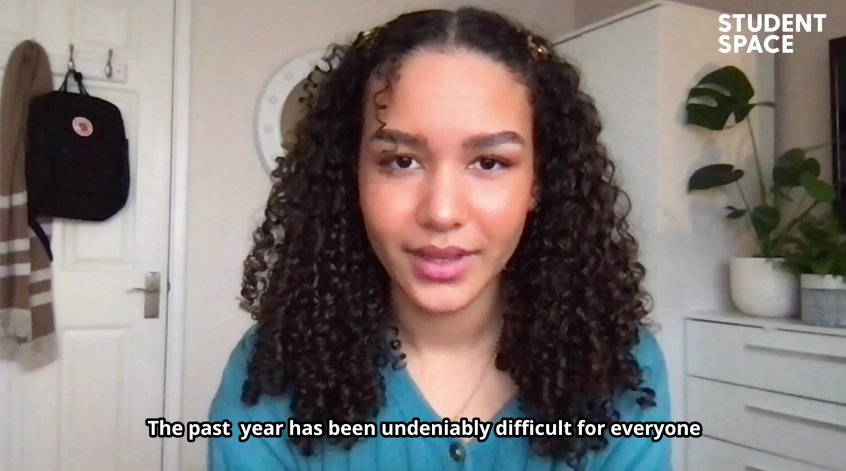Summary: Fatema shares the three big things she has learned about her mental health during the pandemic: listening to her body, rebuilding her coping strategies and speaking openly with her family.
Managing mental illness during the pandemic
Fatema’s three tactics to support her mental health are: listening to her body, rebuilding her coping strategies and speaking openly with her family.
Fatema shares what she has learned about adapting how she manages her mental health during the pandemic.
- Video transcript
The pandemic has affected my life as a student and as someone with a mental health condition, in many ways - from disrupting my degree to forcing me to reevaluate my housing situations.
When we went into lockdown, I moved back in with my family. I had been so used to living on my own, it took months for me to feel settled in my new environment. However, through the multiple lockdowns and tiers we have faced, there have been 3 big things I have learned about myself and my mental health; listening to my body, rebuilding my coping strategies and speaking openly with my family.
We have all had different ways of adapting to the new normal of the pandemic, but as someone with a mental health condition, COVID has had its challenges. Before the pandemic, I had personalised different ways of coping with my mental health’s highs and lows.
When I was first diagnosed it took me a year to build personal coping mechanisms and only a few weeks in isolation to break them. Understandably, staring at the same 4 walls and your computer screen for months on end would drain anyone. I saw numerous posts on social media talking about the importance of staying active, taking breaks and finding new hobbies.
With all that being great advice, it felt insufficient for me in my mental health because during my non-COVID life, it was activities like going dancing and exploring new locations in London that helped me de-stress and kept my mental health happy.
Rebuilding these coping mechanisms to ensure they were more COVID-friendly took time, but eventually I found ways to give back power and control to my life and mental health. I found setting goals and achieving them gave me a great sense of order and purpose and verbalising my worries to my family and friends I hold dear, allowed me to work through them before it got too hard to handle.
With all things regarding university shifting to online remote content, mental burnout is something I faced regularly during coronavirus. As we went into lockdown during a pivotal part of my BSc year, when I was writing my group dissertation, finding the motivation to continue with university work was something I struggled with on a daily basis.
For me, mental burnout looked like; having trouble focusing or remembering things, having a sense of failure or self-doubt, lacking motivation or feeling defeated. Initially, I would try and fight my body to generate motivation within myself, pushing myself to continue working even when my body was telling me otherwise. I realised that pushing myself was actually counterproductive to my productiveness. By listening to my body and mind when I was exhausted, and taking time to re-energise, I prevented myself from entirely burning out. I grasped the importance of channelling my good days, ensuring I make the most of it, while forgiving myself for taking time off when I needed it. Resting and rebuilding yourself is a form of self-care and love and something I think we all need to practise on a regular basis.
Coming from an Asian household, where mental health can still be awkwardly discussed, isolating with my family made it harder to work through my lows at times. Having said that, my family has come a long way in opening-up and discussing mental health.
One thing I have learned is the importance of setting boundaries and there is no shame in asking your family to respect these boundaries. I asked my family to try and avoid convincing me to get out of bed, when my body needed to rest or giving me space to be alone when I needed time, without asking me too many questions. Setting boundaries with my family helped me work through my feelings on my own schedule, while maintaining a healthy and happy relationship with them. Albeit difficult, setting boundaries was another important part of self-care as I was taking responsibility for how others treated me and my own needs seriously.
Through all the challenges I faced during COVID, I learned a lot about myself and more importantly my mental health. By listening to my body, rebuilding my coping strategies and speaking openly with my family I have been able to adjust to the everlasting hurdles COVID has thrown at me!

Find support
See what support is available at your university




